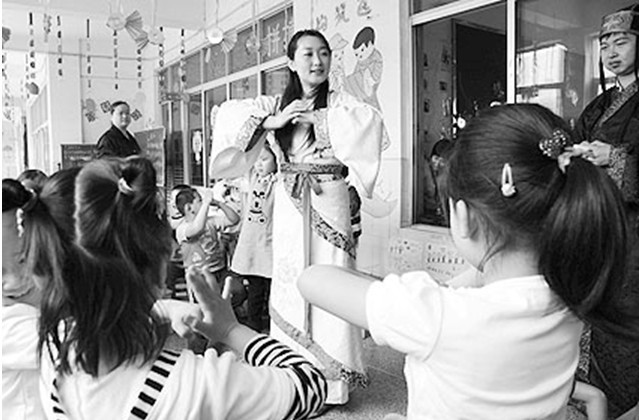"Traditional etiquette is essential in daily life. Unfortunately, I have little knowledge of that," said Yang Dan, a postgraduate student of China University of Political Science and Law.
Treating her parents like friends, Yang seldom pays attention to traditional Chinese manners when she communicates with them. But sometimes she has to.
"On New Year's Eve, when we gather around the table for the family reunion dinner with our grandparents, I have to pay attention to where I should sit, and get reminded by my parents," said Yang.
Yang is one of many Chinese youths who want to know more about the traditional etiquette. According to a recent survey by China Youth Daily, 86 percent of the 3,622 surveyed (nearly 90 percent were born after 1970) think traditional etiquette and protocol are still important in modern society, yet just over half of them are actually familiar with etiquette, and only 16 percent still follow it.
Most of the traditional etiquette and protocol are rarely seen in China, such as elderly individuals being seated at the head of the table, serving a cup of tea to eight-tenths full, and greeting each other with hands in the "gong shou" position, which is the palm folded over the fist.
The absence of traditional manners can be attributed to several things. The survey showed most people found there are few occasions to follow the manners, as the extended family has become less prevalent, so there aren't many opportunities to learn the etiquette. Some have advocated abandoning troublesome old manners in favor of modern life. And some blame Western etiquette for replacing the traditional Chinese version.
However, Jiang Jingping, a professor at Hunan Women's College and also an etiquette expert, says don't blame the West.
"The influence of Western etiquette and protocol is not the biggest threat to our traditions, although they are often welcomed and followed by young people," said Jiang. "The biggest problem is that we are at the intersection of 'old' and 'new' etiquette. It's urgent to rebuild Chinese etiquette that's suitable in modern society."
As the society develops, some traditions are inherited, some have evolved and some are totally abandoned. According to Jiang, the elderly always observe traditional manners, while the youngsters lack knowledge of them.
According to the survey, 66 percent said traditional manners are an important part of Chinese culture, and Jiang echoed that sentiment and added that etiquette is a reflection of self-cultivation and encourages good behavior.
"Etiquette is a standard of social behavior and a cushion for interpersonal conflicts. It helps people distinguish good from evil, courtesy from rudeness, and beauty from ugliness," Jiang said.
Traditional etiquette can also strengthen the sense of national identity. Jiang took Japan as an example.
"Japanese still greet each other with a bow and wear the kimono on formal occasions. Modern life doesn't change their attitude towards traditional manners," said Jiang.
Why do people become more indifferent and restless as they enjoy a better life and free environment? It's the right time to value traditional etiquette. But there's a long way to go.
"Etiquette is accumulated in social life. We can't make regulations by issuing rules," said Li Hanqiu, a professor of human studies. "It depends on everyone's awareness."
 |
|
A teacher shows the traditional "gong shou" greeting to pupils in Linyi, Shandong Province on August 9. |
(China.org.cn by Huang Shan on August 19, 2010)
Go to Forum >>0 Comments